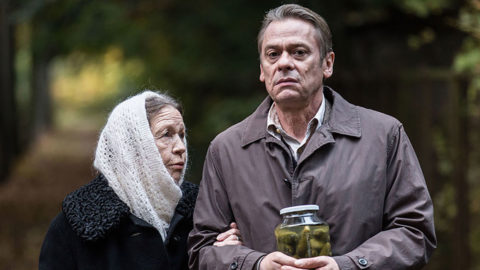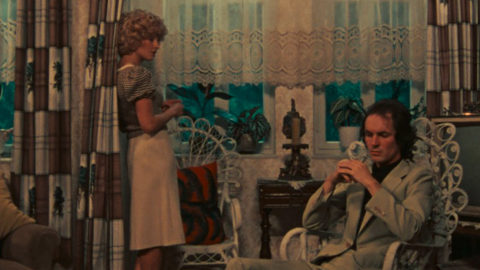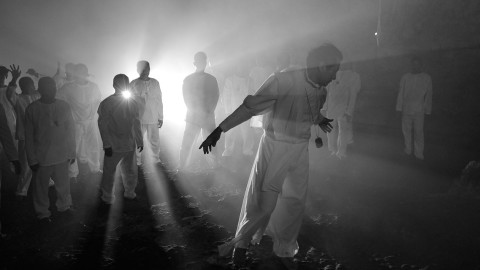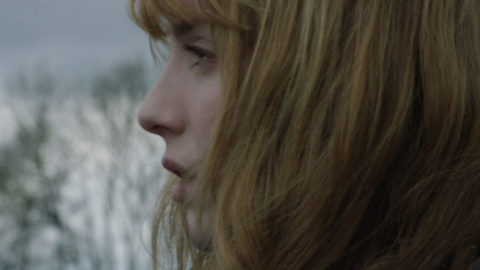Festivals: Berlin 2017
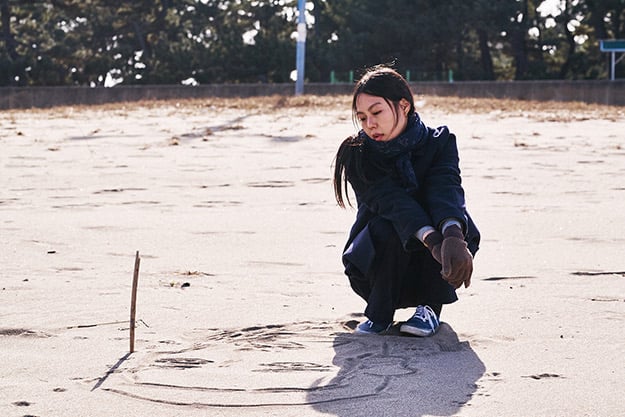
On the Beach Alone at Night
Of the films that premiered at the 67th Berlinale, more than a few were marked by an audaciously direct engagement with the facts of the world. Their motivation perhaps grew less from a hunger for reality amid the uncertain political climate engulfing the entire planet than by a pervasive sense that one need not bother delving so deeply into the recesses of the imagination to find something worth putting on the screen. And, indeed, both autobiography and the news seemed perfectly sufficient for providing tales worth telling.
Unapologetically situated in the overlapping portion of the private/public Venn diagram, the latest film from South Korean master Hong Sangsoo, On the Beach Alone at Night, took many by surprise with its disarming frankness and emotional wallop. Premiering in the Competition, where it won a Silver Bear for Best Actress, Hong’s new work was met with no shortage of responses in the vein of “oh no he didn’t!” But it begins by asserting its credentials as, of all things, a German film. The first leg of On the Beach Alone at Night was shot a mere two-hour drive from Berlin, in Hamburg, where reasonably famous actress Young-hee (played by reasonably famous actress Kim Min-hee) is laying low after the end of an affair with a not-quite-as-famous, married filmmaker. There she hangs out with a fellow Korean expat, listens to a bookshop owner play piano, avoids a stranger in the park, and eats dinner at the home of a local couple (played by Canadian critic/filmmaker Mark Peranson and German art curator Bettina Steinbrügge), who take her for a chilly, overcast stroll on the beach, at her request. One aggressively surrealist segue later and we’re back in South Korea, where Young-hee receives less than a hero’s welcome upon her hush-hush return. She revisits a slew of old relationships, eats, drinks, dreams, and reflects, all of this activity tinged with poignancy—or, more precisely, regret over sharing a world with people who care way too much about her business.
Hong is, of course, no stranger to transfiguring the contents of his life into art (relevant examples include… all of his previous films), but On the Beach Alone at Night more than earns its title’s perhaps accidental reference to the similarly melancholic and achingly personal Neil Young album. Yes, Kim’s character is a version of herself, and yes, the filmmaker with whom she has had an affair is an overt proxy for Hong himself; but the story here is less how Hong fearlessly plumbs his own recent, tabloid-fodder private drama than what he says about the experience of fleeing from those who disapprove of the vagaries of one’s heart. The excellent Kim is never less than captivating, vacillating between being withdrawn and utterly present, annoying and endearing, fragile and cruel. Ultimately, On the Beach Alone at Night is marked by a certain unevenness that matches the speed with which it was written and shot, but its terrible highs are as gut-wrenching, funny, and formally freewheeling as anything in recent cinema, while its lows are negated to some degree by the sense that the film’s messiness is a prerequisite for any artwork so grounded in the crucible of life in which it was forged.
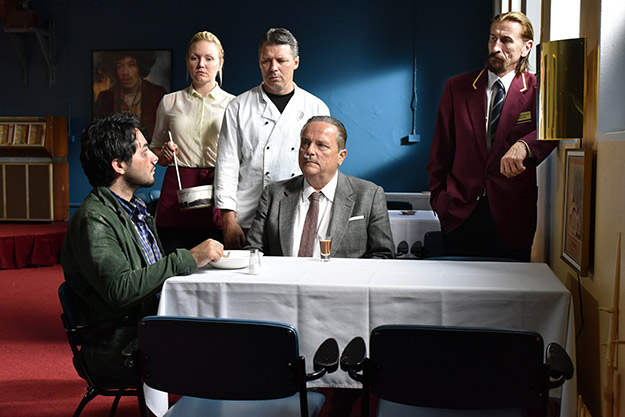
The Other Side of Hope
Ripped, in its way, from the headlines is another Competition standout, Aki Kaurismäki’s The Other Side of Hope, for which the legendary Finnish auteur was awarded the Best Director Silver Bear. Kaurismäki’s first feature since 2011’s comparably compassionate Le Havre begins with Syrian Khaled (Sherwan Haji) emerging from the rubble of an exploded building in Aleppo, and he soon sets about seeking asylum in Finland, getting lost within and betrayed by a not so vast yet nevertheless maddening circuit of bureaucracies, immigration centers, functionaries, and cops. Officially denied refuge by the state, Khaled stakes out on his own, hoping to find a place to lay his head until he can locate his sister, who has also fled Syria. Meanwhile, a typically Kaurismäkian shirt salesman, Wikström (Sakari Kuosmanen), bets all his money in a high-stakes game of poker, winning enough to be able to retire from his profession and purchase a bar-restaurant, The Golden Pint, which he intends to run as something of a labor of love. (He also inherits The Golden Pint’s equally Kaurismäkian kitchen and waitstaff, each of whom brings the deadpan comic relief in spades.) Fate crosses Wikström and Khaled’s paths, and the film unfurls as a succession of schemes—to protect Khaled from the authorities, to keep the restaurant afloat, and to reunite Khaled and his sister.
The proceedings are rendered with a refined, pitch-perfect variation of the Kaurismäki touch, and the film’s visual aesthetic amounts to an effortless tutorial in blocking, where to place the camera, and where to place a humorously incongruous Jimi Hendrix poster amid the shabby, unremarkable decor of an ineptly run restaurant. One would be mistaken to assume that, given Kaurismäki’s taste for wry mannerism, the performances here would be of secondary interest; far from it—Haji approaches the role of Khaled with understated charisma and a relentless aura of sympathy, while Kuosmanen transforms Wikström into a reliably canny, sensitive, and moral figurehead behind the façade of a comic automaton. More so than even Le Havre (2011), The Other Side of Hope is explicitly political, as a community (small as it may be) coalesces around the protection and safeguarding of Khaled in light of the bloody, brutal conflict he’s trying to escape. Moving, funny, a delight to look at, and marked by some of the best timing in the biz, Kaurismäki’s latest might also speak more profoundly about the Syrian crisis and its intercontinental reverberations than a straight-on documentary ever could; but more incontrovertibly, it functions as a user’s manual for how to have a little heart.
Dealing with today’s political realities in an altogether more oblique fashion was Neïl Beloufa’s Occidental, a standout in the Berlinale’s 40-plus-title Forum section. Only the second feature by Beloufa (better known in the art world than on the festival circuit for his videos, installations, and sculptures), Occidental is an artificial-to-the-core, purple-and-pink, hotel-set fever dream, and an exhilarating exercise in stagey cinema composed under the sign of Josef von Sternberg, Paul Vecchiali, and Bertrand Bonello. Two well-dressed, rakish men claiming to be an Italian couple (Idir Chender and The Ornithologist’s Paul Hamy) check into the titular ’70s-looking, budget Paris hotel while political demonstrations turn violent on the streets outside. But it’s clear from the get-go that these two aren’t who they say they are and that they don’t come in peace… The hotel’s staff (a delightful ensemble rivaling that of The Other Side of Hope’s The Golden Pint), whose three members are each an eccentric of some stripe (including the one played by Hamza Meziani, who’s every bit as good as he was in Bonello’s Nocturama), react to the uncertain menace embodied by these two dandies with delirious range: fascination, sexual attraction, suspicion, fear, sometimes all at once. The hotel’s other guests—a belligerent pack of drunken English frat bros and an American guy and his much-younger female partner—flit in and out of the action (almost all of which is confined to the hotel’s lobby), usually without consequence save but for a laugh or two. The creeping sense that something terrible is about to happen gradually swells to the breaking point, but the presentation of what exactly that something terrible is (and just how terrible we’re talkin’ here) and what happens next is an utter blast to behold (think The Towering Inferno meets the May ’68 riot scenes in Regular Lovers).
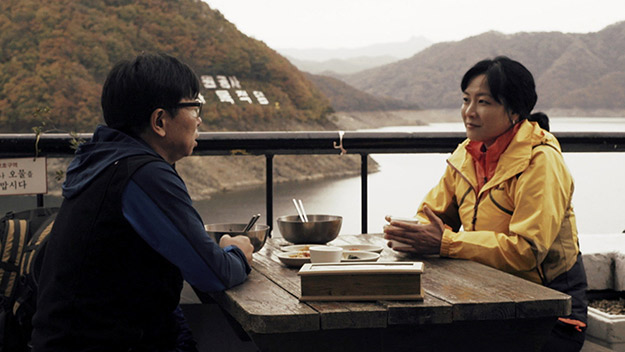
Autumn, Autumn
Occidental has style to spare: Beloufa patterned the film’s postmodern mise en scène (entirely and unmistakably constructed on a soundstage) after hazy memories of Holiday Inns, Best Westerns, and the like. Adorned with a delectable electro score and woozy, oneiric atmosphere suggesting a reverie teetering on the precipice of a nightmare, Occidental effortlessly mutates from a thriller to a would-be sex comedy to an obscure political meditation, and back again. It’s truly a film to give oneself over to, and it announces Beloufa as a consummate stylist to keep on the radar.
Remaining within the Forum yet swinging back to the “personal” end of the spectrum, Jang Woo-jin’s sophomore gem, Autumn, Autumn, opens with three people of unclear relation seated side by side on a train bound for the city of Chuncheon. We spend the first half of the film with one of them: a young man named Ji-hyeon (Woo Ji-hyeon) who, upon arriving in Chuncheon, rapidly has a promising job opportunity fall through, and finds himself working at his friend’s mother’s restaurant, reaching out to old acquaintances and trying not to break down amid the escalating anxiety. Then, halfway through the film, the title card lands at long last, and we proceed to spend the rest of the trip with the other two train riders, a middle-aged man and woman named Heung-ju and Se-rang (Yang Heung-ju and Lee Se-rang), who evidently don’t know each other quite as well as our first glance at them seemed to indicate. As it turns out, they’ve connected over the Internet and are meeting in person for the first time. They politely grill each other about their families, friends, and dating histories, and a possible love connection develops between them, before it slowly but surely grows increasingly unlikely, albeit for rather enigmatic reasons (but such is life!).
Autumn, Autumn’s bifurcated structure and immersive long takes obviously recall Hong as well as Apichatpong Weerasethakul, but Jang renders the understated, quotidian drama with an especially refined eye for the dying of the light, exceptionally and subtly clever compositions, and a sense of the sheer weight of duration. Ostensibly modest yet sneakily ambitious (not to mention laden with tiny details, repetitions, and internal rhymes that make subsequent viewings that much more rewarding), Autumn, Autumn is a smallish marvel, and its director is unmistakably one to watch.
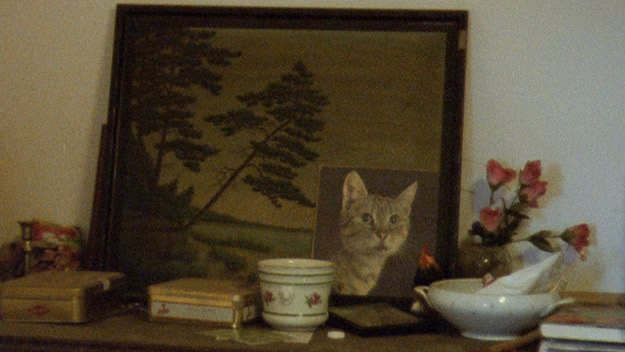
From a Year of Non-Events
Arguably more miniature though no less warm than some of the aforementioned films was another Forum highlight, From a Year of Non-Events, the latest from the German duo René Frölke and Ann Carolin Renninger. Frölke’s projects to date have been something of a commentary on the vérité tradition: his medium-length film Guided Tour (2011) not unironically captured a visit by then–German president Horst Köhler to the famous Karlsruhe University of Arts and Design, while his feature Le Beau danger (2014) was a collage-like yet head-on portrait of the Romanian writer Norman Manea. Co-directed with his usual producer Renninger, From a Year of Non-Events has a title that evokes the most popular description of Seinfeld and manifests a rare sensibility, in which exacting and tender focus, and exquisite rhythm cohere to yield a slight but rich portrait of Willi, a near-90-year-old living alone on a farm in a blissful state of dilapidation in North Germany. Frölke and Renninger measuredly present fragmentary glimpses of Willi’s everyday life through a sophisticatedly interwoven tapestry of Super-8 and 16mm images, patiently rendering the old man as he mills about in his walker, talks to himself, feeds chickens, hangs out with his cats, and reminisces about (apparently more eventful) days past to a revolving cast of family members and the filmmakers.
But From a Year of Non-Events also takes care to show plenty of the lush, overgrown environment in which Uncle Willi Recalls His Past Lives, leaving us with an indelible sense of a place, a man, and the histories lurking within. (It also bears mentioning that there are lots of pretty, grainy images of cats, for those of you who are into that sort of thing.) At one point in the film, when no image occupies the screen, Frölke and Renninger explain to Willi that they need to pause for a moment in order to load another roll of film into their camera. He responds: “But what have you filmed so far? Nothing!” The eminently pleasant From a Year of Non-Events acquaints us with a kinder, gentler understanding of nothingness, which just might be part of the antidote to today’s more widespread and decidedly less compassionate attitudes about being in the world.
Dan Sullivan is the assistant programmer at the Film Society of Lincoln Center.



